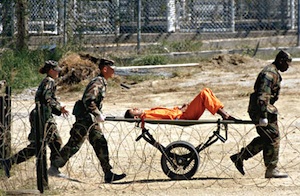Guantanameros and the fingerprints of bad lawyers
 Roger Fitch Esq •
Roger Fitch Esq •  Thursday, April 28, 2011
Thursday, April 28, 2011 The Guantánamo files ... Roger Fitch, Our Man in Washington, provides some historical context ... The law of indefinite detention
 I told you so. For years the Bush, and then Obama, administrations have insisted everyone at Gitmo was most likely guilty of something, was a danger or a threat.
I told you so. For years the Bush, and then Obama, administrations have insisted everyone at Gitmo was most likely guilty of something, was a danger or a threat.
The Guantánamo Files just released by WikiLeaks tell a different story.
The New Yorker provided a cross-section of prisoners and reasons for their detention:
"A sharecropper because he was familiar with mountain passes; an Afghan 'because of his general knowledge of activities in the areas of Khost and Kabul based as a result of his frequent travels through the region as a taxi driver'; an Uzbek because he could talk about his country's intelligence service, and a Bahraini about his country's royal family (both of those nations are American allies); an eighty-nine year old man, who was suffering from dementia, to explain documents that he said were his son's; an imam, to speculate on what worshippers at his mosque were up to; a cameraman for Al Jazeera, to detail its operations; a British man, who had been a captive of the Taliban, because 'he was expected to have knowledge of Taliban treatment of prisoners and interrogation tactics'; Taliban conscripts, so they could explain Taliban conscription techniques; a fourteen-year-old named Naqib Ullah, described in his file as a 'kidnap victim,' who might know about the Taliban men who kidnapped him."
There you have it: people were held, not because they waged war against the US, or were "terrorists" or were a "threat", but because they might have information which could be extracted from them.
People aren't indefinitely detainable just to question them, under the law of war or - according to the US Supreme Court - under Congress's Authorisation to Use Military Force passed after the 9/11 attacks.
Habeas corpus was always essential for the wrongly held to show their right to release, but it was denied by the Bush administration on the basis that the Guantánamo Bay naval base was outside US jurisdiction.
 Life (and death) at GitmoThis was contested, long before the first men and boys ostensibly captured in Afghanistan were brought to the Cuban outpost.
Life (and death) at GitmoThis was contested, long before the first men and boys ostensibly captured in Afghanistan were brought to the Cuban outpost.
Habeas has been there all along, though the Pentagon and its loyal media try to convey the idea it's a mere three years since Guantánamo prisoners were "granted" the right to habeas.
A little historical context is required.
The first judicial extension of habeas to aliens detained at Guantánamo was in 1992 in the case of the Haitian refugees sent there by George Bush père.
While a court of appeals precedent was later withdrawn through the skulduggery of Bill Clinton, the subsequent grant of habeas to those at Gitmo by federal courts would not have surprised lawyers less political and more competent than those of Bush fils.
Bad lawyering has its fingerprints everywhere at Guantánamo.
The first 21st century Gitmo habeas petition was filed in January 2002, right after the camp opened, and was upheld in the stirring 9th circuit Gherebi decision of December 2003, with this memorable quote:
"Under the government's theory, it is free to imprison Gherebi indefinitely along with hundreds of other citizens of foreign countries, friendly nations among them, and to do with Gherebi and those detainees as it will, when it pleases, without any compliance with any rule of law of any kind, without permitting him to consult counsel, and without acknowledging any judicial forum in which its actions may be challenged. Indeed, at oral argument, the government advised us that its position would be the same even if the claims were that it was engaging in acts of torture and that it was summarily executing the detainees. To our knowledge, prior to the current detention of prisoners at Guantanamo, the US government has never asserted such a ... startling proposition ... a position so extreme that it raises the gravest concerns under both American and international law."
Perhaps all the Guantanameros have been held illegally, one way or another. It's true that the DC Circuit upheld the latest detentions there, based on the 2001 AUMF, and the Supreme Court denied certiorari.
No appellate decision, however, has ever upheld the manner of their detention, determined whether it violates US law and the Geneva Conventions - as it surely does, not least because the US Congress has never authorised the departures from US law and the law of war which have occurred there.
There seems to be no precedent under military or civilian law to hold a prisoner indefinitely just to see what information you can get out of him, without regard to any other right to hold him as a war prisoner or criminal accused.
But the Guantánamo Files show that interrogation produces results, if not the truth. Thus eight prisoners were used to build cases against another 255, and in one case a single prisoner implicated 123 others.
An honest prosecutor would find those numbers suspicious.
 Guantanamo
Guantanamo 









Reader Comments